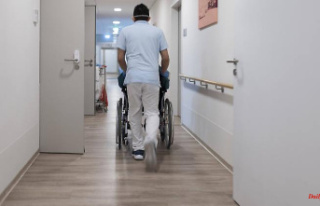A moment's disregard and it can happen: so-called knockout drops can quickly get into an unattended glass and cause it to collapse. This happened to a woman. With education, she now wants to protect others from this experience.
It was two beers at the carnival in Bonn. So-called knockout drops were probably mixed into one of the glasses. "I'm missing ten hours of memory," says Alexandra Roth. She collapsed in front of a bar. "Luckily my best friend was there and called my husband. He's a doctor." She was 41 years old when the 2018 incident happened. "I never thought that I belonged to the target group." The mother of two daughters is now warning others about the dangers of these drops with an awareness campaign.
Alexandra Roth fears that more people will seek help from her again this summer. Unlike in the past two years, celebrations can again be left out and largely without corona restrictions. At festivals people dance again. Bars and clubs stay open until the morning. An easy game for offenders.
They pour the mostly tasteless and odorless chemicals into their victims' drinks. Knockout drops work like drugs. After a few minutes, people become dizzy, unable to think or act clearly, and feel as if they were drunk. Shortly thereafter, they become unconscious for minutes or even several hours. The perpetrators use this time for sexual offenses or to rob. The victims can usually no longer remember it afterwards.
This complicates the police investigation. Especially since the drops cannot be detected in the body for long. "It's about six hours in the blood and twelve hours in the urine," says Céline Sturm from the victim protection organization Weißer Ring. According to the Frankfurt police, such acts are usually "reported with a time delay". Then an investigation is no longer possible. The perpetrators remain unrecognized.
Victims often stated that they had received knockout drops, but "the alcohol consumption found indicates that these are likely to be responsible for the failure or memory gaps," is the experience of the police headquarters in Frankfurt am Main. Victims' associations sometimes complain that the police do not always show enough sensitivity on this issue.
For how many women and men the party ended badly cannot be said. "The data is very thin," explains Sturm, who is responsible for crime prevention. The police headquarters in Munich speaks of a “low number of police investigations” for the years 2018 to 2021. The Berlin police recently published statistics on the situation in the capital. In the corona pandemic, there were fewer such crimes. While the investigators investigated 71 cases in 2019, there were 31 in 2020 and 21 last year. Just a few days ago, at a summer party of the SPD parliamentary group in Berlin, several people were attacked with the drug, most of them women.
What are these drops? "By this we mean a lot of different substances, sometimes up to 200, which are used as knockout drops," explains Céline Sturm. These include ketamine, a veterinary anesthetic, and GHB (gamma-hydroxybutyric acid), commonly known as liquid ecstasy. The drugs are sometimes taken voluntarily in small doses by revelers as a party drug in clubs.
Many of these substances are actually freely available in Germany. According to the Federal Drugs Commissioner Burkhard Blienert, other prescription drugs are partly covered by the narcotics law. But not all.
Blienert refers to the substance GHB, which is made from gamma-butyrolactone (GBL) and 1,4-butanediol (BDO). These are industrial chemicals that are manufactured, traded and industrially processed in large quantities. Neither fall under the Narcotics Handling Act. In the past there were repeated calls to include the GBL substance in the law.
The White Ring, however, sees politicians as having a duty on another point: "We have to do a lot more educational work on the subject," demands Sturm. Teachers should be sensitized to the topic during their training and further education. More research should also be done on this.
Quite a few victims do not go to the police after a crime, also out of shame. "You're so ashamed of it. Did you make a mistake yourself?" Asked Alexandra Roth. With their initiative "NO! K.O." she wants to take away such fears and give tips: for example, don't leave drinks unattended in clubs and watch out for each other. She also advises: "celebrate together and go home together".












